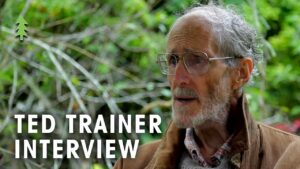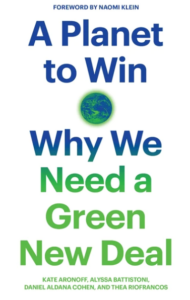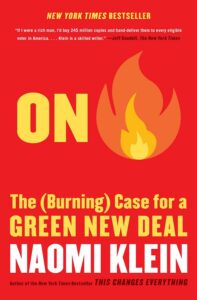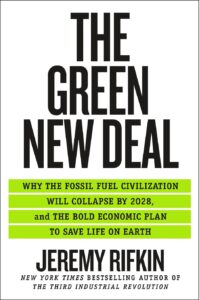Is the “Green New Deal” a solution or another problem? Rethinking our options first with Dr. Ted Trainer, founder of The Simpler Way in Australia. From Cambridge, political economist Jeremy Green finds dangerous myths in the New Deal for an overloaded system. Look out for the growth monster wearing green clothes!
Listen to or download this Radio Ecoshock show in CD Quality (57 MB) or Lo-Fi (14 MB)
Acapulco Mexico wiped out without warning. Sea ice crash at both poles. Scorching record October heat in Africa, South America, and globally. As environmental crisis multiply, cries for a government solution get louder. Will the response make it worse?
Mass media is overloading with death and violence, while good people are told to shelter in place. Beneath the waves of the latest attacks, a human engine continues to devour the planet, pumping waste into land, sea, and the atmosphere. This program reports the deeper layer, below the waves, the drivers of chaotic reality. I’m Alex Smith. Thank you for listening to Radio Ecoshock and caring about our world.
********
PLEASE SUPPORT THIS INDEPENDENT SCIENCE REPORTING IF YOU CAN… it’s easy here. Every donation absolutely helps Radio Ecoshock keep going, and keeps it free (and advertising free) for people all over the world. I don’t send you annoying emails, or appeal on the air. It’s an honor system.
********
TED TRAINER: NO GREEN WITHOUT DEGROWTH
Is the Green New Deal possible? Can we really keep growing without wrecking more of the ecosphere? What is the addictive need to always promise people more? Why not live a simpler happier way of life?
Dr. Ted Trainer led that exploration. Ted is an independent scholar, based in Sydney, Australia. He retired as lecturer at the School of Social Work, University of New South Wales. Trainer published numerous books and articles on personal sustainability and community, including Pigface Point, an alternative lifestyle educational site near Sydney. He has also published a peer-reviewed paper on the Green New Deal.

Image Credit: Happen Films
Listen to or download this 29 minute interview with Ted Trainer in CD Quality or Lo-Fi
In this interview we employ a four-step process. We being with Ted’s assessment of where we are now. Then I have questions about his 2022 technical critique of the most popular solution from governments “The Green New Deal”. We will follow up with Trainer’s counter proposal, “the simpler way”, and first steps to get there.
No one gets elected promising people they must live with less. Instead, from Europe to Korea, the Green New Deal is popular, because it promises growth without the sin. In May 2022, Trainer published “A technical critique of the Green New Deal”.
Here is part of the Abstract for that paper, which we discuss in the interview:
“In view of the attention Green New Deal [GND] proposals have received there has been very little concern to assess its technical feasibility. It involves two major technical claims, firstly that renewable energy can sustain present societies at a relatively low cost, and secondly that economy can be decoupled from resource consumption and environmental impact…
…This article puts reasons for rejecting both claims and then considers the implications for the design of sustainable and just systems. It is concluded that GND goals cannot be achieved unless there is large scale degrowth to radically different economic, social and political systems. A novel perspective on the transition, contradicting GND thinking, is indicated.”
Trainer concludes that:
“…a sustainable and just world cannot be achieved unless there is very large scale Degrowth and extremely radical alternative social forms going far beyond GND are embraced.”
In a 2021 paper reviewing the Green New Deal and Degrowth, Riccardo Mastini, Kallis and Hickel suggest, quote: “…despite important tensions, there is room for synthesizing Green New Deal and degrowth-minded approaches into a ‘Green New Deal without growth’.”
A SIMPLER WAY
Ted Trainer is founder of a movement called “Simpler Way’. Again, his Abstract from a 2019 paper (”Remaking settlements for sustainability: the Simpler Way”) explains our predicament clearly:
“In view of the global resource and ecological situation, per-capita resource consumption rates in the rich world probably need to be reduced by 90%. This can only be done if there is a “de-growth” transition to some kind of Simpler Way centered on mostly small, highly self-sufficient and self-governing communities in control of local economies within a culture that is not focused on material wealth.
It is not surprising that the viability of such a vision is typically regarded as implausible. The aim of this study is to show that normal outer city suburbs could be restructured along the lines required to cut global impacts by the necessary amount, while improving the quality of life. Data on typical Australian consumption rates, food production yields, suburban geographies, etc. is used to estimate the achievable reductions. The theoretical conclusion that such reductions could be made aligns with a study of the Dancing Rabbit Eco-village in northeast Missouri. Heavy cuts in resource consumption cannot be made without extreme change in economic, political, settlement and cultural systems.”
FIND OUT MORE ABOUT THE SIMPLER WAY
I recommend you start with Ted’s Simpler Way web site, and this 2020 book “The Simpler Way: Collected Writings of Ted Trainer”.
Ted Trainer strongly recommends his new video on YouTube “THE SIMPLER WAY: A visit to Ted Trainer’s Pigface Point.”
ECO-VILLAGES OR “THE ROAD”?
I know this self-sufficiency dream. I lived it in Northern Ontario where the back-to-the-land movement formed communes, early women’s movement, home-birthing, living without electricity. Even with 200 acres in the wealthy country of Canada, I came to the conclusion that true self-sufficiency either (a) cannot be done inside a continuing consumer culture. We use batteries, tools and supplemental food coming from the “outside”; or (b) can only happen in a relatively large space with few people and friendly climate and ecosphere; or (c) will only happen if civilization collapses widely for a long time and the survivors are forced into it.
When I spoke with French energy expert Jean-Marc Jancovici in 2018, he reminded us humans DO know how to live without fossil fuels. We did so for most of our existence on Earth, and as recently as 200 years ago. But we cannot go back to those conditions, because we have changed the ecosphere and the climate irrevocably. Whatever future comes, it must and will be novel.
Perhaps after a lot of suffering and mass dying, the survivors may build something better and happier, but as Tom Petty sang: “Learning to fly, without any wings – coming down, is the hardest thing.” Can the transition be kind Transition Towns and Dancing Rabbit Eco-villages, or Cormac McCarthy’s “The Road”? Maybe, says Trainer, we have a slight choice in that.
After a few years living simpler, it feels like only collapse could wake up everyone else. But collapse keeps postponing itself – for decades – creating more damage all the way. In 2016 I did a show called “Can We Count on Catastrophe?” On the other hand, I recently saw a poll showing almost half of French youth agreed people should only fly twice in a lifetime, to limit climate emissions. Young people know. Can they get enough power to get simple before collapse forces us into survival living?
A FEW NOTES FROM THE TRAINER INTERVIEW
At 13 minutes into the interview, Ted Trainer talks about aquaponics. Radio Ecoshock covered this in 2013, with American author of “Aquaponic Gardening” Sylvia Bernstein on the union of fish and veggies.
COOPERATIVA INTEGRAL CATALANA
Trainer also takes inspiration from the Spanish Cooperativa Integral Catalana. This is a well-developed local economy with a lot of humanity. However, it seems the CIC no longer exists – but left many sub-networks still operating. You can read more about it in this 2018 Ted Trainer article at Resilience.org: “The Catalan Integral Cooperative – The Simpler Way Revolution is Well Underway!”,
The Catalan Integral Cooperative – The Simpler Way Revolution is Well Underway!
===================================
GETTING REAL ABOUT GREEN: JEREMY GREEN
The planet is cooking, ice vanishes, storms rage. Many countries promise a “Green New Deal” as the solution. Noam Chomsky, Naomi Klein, Jeremy Rifkin and Robert Pollin want one. But is this just another bad old deal for the climate and natural world? Can it work?



Cambridge Professor of Political Economy Jeremy Green investigated the alluring power of past social success in the Great Depression. His open access paper is: “Greening Keynes? Productivist lineages of the Green New Deal”. If this is our big shot, we all need to dig into what that means.
Listen to or download this 27 minute interview with Jeremy Green in CD Quality or Lo-Fi
IN A 2022 PAPER GREEN WRITES:

“…dominant theoretical paradigms (Varieties of Capitalism and Growth Models approaches) are grounded in a ‘nature/society’ dualism that treats national economic models as environmentally disembedded and causally independent from the Earth System. Economic growth is uncritically elevated as a dominant comparative metric, normative aspiration, and policy objective for capitalist development. These characteristics limit the capacity to engage with green transition.”
THE PAPER “Greening Keynes? Productivist lineages of the Green New Deal” is well worth a read. It’s free, Open Access.
We discuss and compare the “Green New Deal” proposals in the United States and in Europe. The European Green Deal is focused on assisting a transition toward a carbon-free economy. It envisions growth (of course!) but powered by lots more solar and wind, aided by energy efficiency. The EU Green Deal does not make promises of jobs for all, or spreading wealth more equitably.
The Americans, coming out of a Republican Presidency which withdrew from the Paris Climate Accords, and faced with a House controlled by Republicans, hardly dared mention climate change. They hid their climate measures as improvements to the grid and so on. A lot of their infrastructure act was to build more roads and replace bridges, hardly the electrified mass transit the climate emergency requires. I argue America has not seen a New Green Deal at all, compared with Europe’s efforts.
As far as I know, no American Green Deal has been passed. However two large spending bills contain some “green” funding – but don’t really address climate change. However the American “Infrastructure Investment and Jobs Act” tries to address social equity – fairness in the economy, with some ideas of racial justice.
There is a movement in the UK to get a Green New Deal there, but so far little interest from the ruling Conservative Party. South Korea has passed it’s own version of a Green New Deal. So does China. Even the United Nations promises a “Global Green New Deal”.
THE LAST BLAST OF “GREEN” SPENDING?
Jeremy Green writes: “Evoking Christian symbolism, they press the demand for a ‘Last Stimulus’ to pump-prime the economy before breaking with capital and abandoning growth (Aronoff et al., 2019) … Can we move towards massive public investment, mobilizing a discourse of green full employment productivism and going, ‘all out for a decade or two’, and then invert this logic, overnight, to something entirely opposite? “
ALEX THINKS: Everyone wants one last blast of the glory days, lots of new toys, the last voyages to melting poles or disappearing forests. THEN we will reform. Every junkie and alcoholic says “One last shot” before they quit. It’s junkie talk, going on in our own heads, and at the very highest levels of public life.
Chomsky and Pollin’s (2020) Green New Deal also promise full employment blah blah. Plus, Jeremy adds, the focus for Chomsky and Pollin are fossil fuel pollution and climate change. They don’t address disappearing species and wild spaces, declining life in the ocean, loss of soil, trees, and all that. Just the fossil fuel problem. Most actual ecologists believe if we only stop burning fossil fuels, but keep expanding our space and demands, the supportive ecosystem still crashes into catastrophe.
Many New Green Deal proponents focus sharply on preventing disastrous climate change, leaving out destruction of the Amazon, die-offs in the ocean, and general environmental wreckage. I think…
Nature needs a Green New Deal
THE FIRST “NEW DEAL”
The first “New Deal” was passed by the Roosevelt Administration in 1933 – in response to high unemployment, banking woes, and lack of consumer spending. But when that floundered, the classic New Deal took a different turn in 1937.
Green’s paper says: “The structuralists were surpassed by the newly ascendant Keynesian-inspired ‘spenders’ who placed greater emphasis on the need for compensatory fiscal policy, rather than structural-institutional reform, to escape from Depression.”
This is so important. Instead of changing the institutions that bred the Depression, they decided to spend their way out of it. That seems to be the approach again these days…
Green’s paper examined many visions of the Green New Deal advanced by progressive and qualified voices – people like Jeremy Rifkin, Naomi Klein, Noam Chomsky, Robert Pollin, and Kate Aronoff. All of them, in his view, rest on dangerous contradictions, espousing growth when growth is killing the planet.
Green plans promise to continue expanding growth, with better lives for all. We will live just like now, with travel and convenience for wealthy people, but use solar power, electric cars and wonderful new technology. Do you personally think that is possible? Is the Green New Deal just another Capitalist ploy, a last ditch effort to save the system that makes the 1 percent wealthy?
Green writes:
“Proponents of the Green New Deal activate the wrong kind of historicism – attempting to recover the past as an instructive guide to an Anthropocene future marked precisely by its profound difference from previous experiences. The problem of the Depression-era was too little growth, not too much. It was underconsumption not overconsumption. The New Deal sought to remedy class conflict by solidifying social consensus through access to an expanding stock of national wealth (Maier, 1977). This was the productivist framing at the core of the project. How can these assumptions hold alongside a commitment to a steady-state economy and the need to reduce consumption and production?”
THE FINAL SONG
In this program, the kids have the last word. We go out with a green re-write of “We Didn’t Start the Fire” sung by the Torquay Girl’s Grammar School in Devon, UK.
Thank you for listening, and caring about this world (as painful as that can be lately).